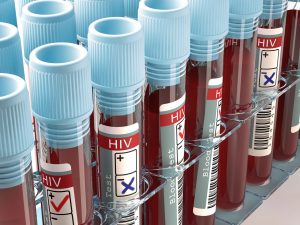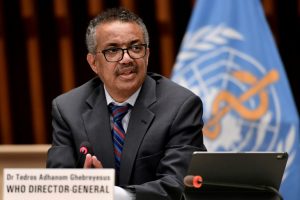“The aim is to be at 5,000 a day – but they’ve not even got to 1,000.”
It’s worth adding that there are some countries on the continent where testing data is not available, such as Eritrea and Algeria.
Some don’t have testing capacity, while others for various reasons won’t give out data.
For example, President Magufuli of Tanzania has said releasing such data creates fear. His country has only released information intermittently, sometimes just giving out the numbers of people who have recovered from the virus.
What are the obstacles to more testing?
Getting hold of the chemical reagents needed to process tests can be difficult, as African countries don’t produce their own and need to compete for limited global supplies.
John Nkengasong of Africa’s Centres for Disease Control says “the collapse of global co-operation and a failure of international solidarity has shoved Africa out of the diagnostics market”.
He says African countries might have funds, but “70 countries imposing restrictions on exports of medical materials” has made it difficult to buy necessary goods.
There are also other barriers to increasing testing, including the lockdown measures to restrict movement, which can make it difficult for people to get to test sites.
However, Ngozi Erondu, assistant professor at the London School of Hygiene and Tropical Medicine, says the bigger issue is the equipment.
“It is not having enough kits and reagents,” she says.
Nigeria’s Centre for Disease Control currently has 18 testing laboratories which can process tests that tell you if you have the disease. But it has put out an urgent plea for essential testing equipment.
Kenya has also admitted to facing challenges in getting testing kits, swabs and reagents, and its overall testing figure has fallen recently as a result.
The head of one of Kenya’s regional governments said recently that there were only 5,000 testing kits in the country, and that they were expecting 24,000 more.
There are also other social and political factors which could be barriers to greater testing.
“In some communities there could be a stigma attached to having the coronavirus,” says Ngozi Erondu. “It’s also the case that local leaders may push back against testing if they are up for an election.”
The African Union and the Africa Centres for Disease Control have launched an initiative, the Partnership to Accelerate COVID-19 Testing (PACT), which focuses on tracking, testing and tracing.
The initiative aims to roll out about one million tests in four weeks across the whole continent.
The earlier coronavirus outbreaks in Asia and Europe gave African states time to consider their responses, and the experience of handling epidemics such as Ebola has also helped them.
But acquiring testing kits in a competitive global market, getting tests to where they need to be and setting up the labs to process samples is not a simple task for countries with less economic clout and weaker healthcare systems.
Source: BBC






